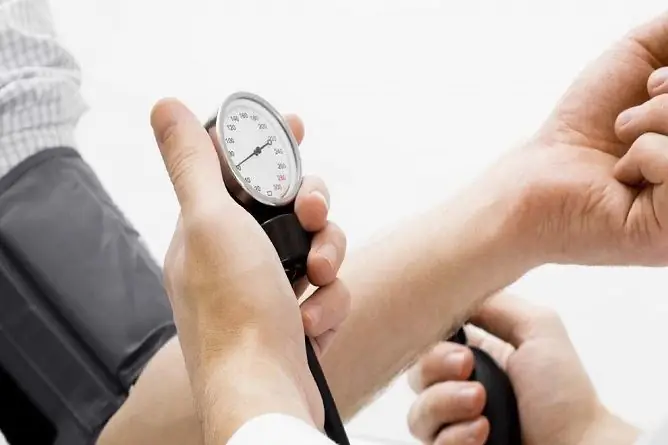- Author Rachel Wainwright wainwright@abchealthonline.com.
- Public 2023-12-15 07:39.
- Last modified 2025-11-02 20:14.
How to lower blood pressure during pregnancy
The content of the article:
- How to lower the pressure of a pregnant woman without medication
- Medicines to lower blood pressure during pregnancy
- What pressure is considered high and needs to be reduced
- Why is arterial hypertension dangerous?
- Video
How to lower blood pressure during pregnancy? If the problem is serious, medications are needed. Not all remedies are suitable for pregnant women, therefore, only a medical specialist should prescribe and monitor therapy.

Drug therapy with antihypertensive drugs for pregnant women can only be carried out under the supervision of a physician
During pregnancy, a woman's body is rebuilt, which affects the general condition. Most of the changes are physiological, that is, normal for the period of pregnancy, although they can manifest themselves with unpleasant symptoms, for example, morning sickness. At the same time, some changes can have negative consequences - these include fluctuations in blood pressure (BP). If hypotension (low blood pressure) is often a physiological condition due to changes in hormonal levels and does not pose a particular danger in the vast majority of cases, then hypertension (high blood pressure) can lead to undesirable consequences in a fairly short time, therefore, you must immediately seek medical help to remove it, that is, to normalize it. At the same time, pills for pressure during pregnancy are not prescribed immediately, at first the pressure is assessed by comparing with the individual norm, and it is found out whether it can be removed without pills. Medicines are prescribed when the risk from their use is lower than that of high blood pressure.
How to lower the pressure of a pregnant woman without medication
If the hypertension is insignificant, they first try to reduce the pressure during pregnancy at home without the help of pharmacological drugs. It will not be possible to shoot it down quickly in this way, but this is usually not required under these conditions.
First of all, it is recommended to adjust the diet - to consume less salt, but more vegetables and fruits, it is recommended to limit carbohydrates, especially fast ones (sugar, confectionery). Berries, as well as fruit and berry juices have a diuretic and hypotensive effect.
With the permission of the doctor, folk remedies can also be used to reduce pressure. Pumpkin broth with honey, freshly squeezed rowan or viburnum juice has an antihypertensive effect - 2 tablespoons three times a day for two weeks. If you have heartburn or other problems with the digestive tract, the juice can be replaced with jelly from these berries.
Soothing decoctions and teas - chamomile, mint, motherwort - have a mild property to lower blood pressure.
Medicines to lower blood pressure during pregnancy
1 trimester is a special, important period, during which the organs and systems of the fetus are laid, including the nervous system, cardiovascular, musculoskeletal. Any violations in the early stages can lead to irreversible consequences, the fetus is especially vulnerable at this time. In the first trimester, only those medicines that do not affect the fetus are permissible for use.
What can you drink to lower your pregnancy blood pressure at this time? If necessary, apply Labetalol (aka Presolol, Amipress), Methyldopa (Dopegit), Nifedipine, Metoprolol.
To reduce pressure during pregnancy in the second and third trimester, a wider range of drugs can be used - the resistance of the child's body increases, it has a certain autonomy and stability. However, the danger of hypertension in the later stages does not decrease, but increases, therefore, more powerful drugs are used. What tools can be used? These are diuretics - Furosemide, Verapamil, Hydrochlorothiazide (Hypothiazide), Indapamide (Arifon) and a wide range of adrenergic blockers - Atenolol, Propranolol, Nebivalol, Talinolol and others. Angiotensin-converting enzyme inhibitors are widely used - Captopril, Enalapril, Lisinopril and others. A highly effective agent is calcium antagonists - Nifedipine, Amplodipine.
An additional group of drugs for combating hypertension includes alpha-blockers like Prazosin and Doxazosin, imidazoline receptor agonists - Physiotens.
When taking medications, it is necessary to monitor the dynamics of blood pressure decrease and take measurements every few hours.
During pregnancy, you should not take outdated medications such as Magnesia sulfate or Papaverine hydrochloride, especially intramuscular or intravenous administration is undesirable. They do not have a point effect, but affect the entire body, therefore, they can harm the fetus.
It is strictly forbidden to take any medications without consulting the doctor attending or supervising the pregnancy.
What pressure is considered high and needs to be reduced
Before taking any medications, you should consult with your doctor and measure your blood pressure. Each person has his own norm, which he should know - perhaps the numbers considered to be high blood pressure do not pose a danger to an individual woman.
Indicators of normal pressure are subject to individual fluctuations, but on average they are in the range from 120 to 140 mm Hg. Art. systolic and from 70 to 95 mm Hg. Art. diastolic pressure. For pregnant women, this figure is usually slightly lower. Figures exceeding 140 by 90 mm Hg. Art., are considered hypertension. A dangerous condition is an increase in blood pressure to 160 by 110 mm Hg. Art., when signs of damage will appear quickly enough.
Why is arterial hypertension dangerous?
A persistent and long-term increase in blood pressure can occur independently or be caused a second time, that is, due to violations of the organs and systems that control it. The first option is called essential hypertension, does not have clearly defined causes (the pathogenesis of this condition forms a vicious circle - one link provokes another, so the pressure does not decrease for a long time) and is treated symptomatically. With secondary hypertension, it is more and more difficult - it may indicate damage to the heart and blood vessels, kidneys, endocrine system. Therapy in this case is aimed at treating the underlying disease.

Pills are not always needed to lower blood pressure during pregnancy, sometimes nutritional correction is enough
Hypertension is a dangerous condition, since high blood pressure can provoke damage to the so-called target organs. These are kidneys, liver, brain, heart. Deterioration of the mother's condition, in particular the deterioration of blood circulation, adversely affects the fetus, leading to complications:
- Premature placental abruption, which is accompanied by bleeding and leads to the death of the fetus.
- Damage to shock organs, which can result in a heart attack, stroke, transient ischemic attack, acute vascular insufficiency, chronic renal failure.
- Eclampsia as a form of extreme condition (gestosis), in which, due to high blood pressure during gestation, its blood circulation is disturbed. The child's cardiovascular system is inextricably linked with the mother's, therefore, a change in blood gas composition or pressure is reflected in the child.
- Fetal pathologies due to its hypoxia - developmental delays, damage to various organs and systems (including the brain), late miscarriages.
Video
We offer for viewing a video on the topic of the article.

Nikita Gaidukov About the author
Education: 4th year student of the Faculty of Medicine No. 1, specializing in General Medicine, Vinnitsa National Medical University. N. I. Pirogov.
Work experience: Nurse of the cardiology department of the Tyachiv Regional Hospital No. 1, geneticist / molecular biologist in the Polymerase Chain Reaction Laboratory at VNMU named after N. I. Pirogov.
Found a mistake in the text? Select it and press Ctrl + Enter.






